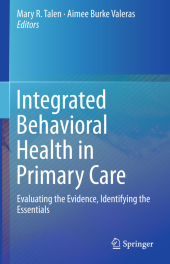 Neuerscheinungen 2015Stand: 2020-02-01 |
Schnellsuche
ISBN/Stichwort/Autor
|
Herderstra▀e 10
10625 Berlin
Tel.: 030 315 714 16
Fax 030 315 714 14
info@buchspektrum.de |

Aimee Burke Valeras, Mary R. Talen
(Beteiligte)
Integrated Behavioral Health in Primary Care
Evaluating the Evidence, Identifying the Essentials
Herausgegeben von Talen, Mary R.; Burke Valeras, Aimee
2013. 2015. xxiii, 354 S. 24 SW-Abb. 235 mm
Verlag/Jahr: SPRINGER, BERLIN; SPRINGER NEW YORK; SPRINGER 2015
ISBN: 1-493-92909-7 (1493929097)
Neue ISBN: 978-1-493-92909-2 (9781493929092)
Preis und Lieferzeit: Bitte klicken
This book provides a common language for integrated behavioral health and offers collaborative medicine best practices for healthcare procedures-from screening through implementation, and addresses the problem of territorial disputes in healthcare practice.
Contributed by experts who┤ve developed integrative healthcare initiatives with strengths in the areas of policy and principles, organizational systems, or clinical practice. These contributors will illustrate the concepts and describe the nuts and bolts of their integration initiatives. In the conclusion of each section, the editors will construct a template to systematically evaluate these essential elements. This template will organize the information to help stakeholders compare and contrast the strengths, resources, limitations and challenges of how each model meets the vision of integrative healthcare. In the concluding section the information in the preceding sections connects to provide a coherent synopsis of the common themes and practices, from the macro to micro levels of care, which foster successful integration of the medical and psychosocial systems.
Preface.- Part One: Essentials of Integrated Behavioral Health Care.- Chapter 1: Introduction and Overview of Integrated Behavioral Health in Primary Care.- Chapter 2: Integrated Behavioral Health and Primary Care: A Common Language.- Chapter 3: Integrated Behavioral Health and the Patient-Centered Medical Home.- Chapter 4: Advancing Integrated Behavioral Health and Primary Care: The Critical Importance of Behavioral Health in Healthcare Policy.- Part Two: Review of Integrated Systems of Care Initiatives.- Chapter 5: The State of Evidence for Integrated Behavioral Health Care.- Chapter 6: Community-Based Participatory Research: Advancing Integrated Behavioral Health Care through Novel Partnerships.- Chapter 7: Integrated Behavioral Health in Public Healthcare Contexts: Community Health and Mental Health Safety Net Systems.- Chapter 8: The Financial History and Near Future of Integrated Behavioral Health Care.- Chapter 9: Department of Defense Integrated Behavioral Health in the Patient-Centered Medical Home.- Part Three: Review of Collaborative Behavioral Health Clinical Services.- Chapter 10: Collaborative Partnerships within Integrated Behavioral Health and Primary Care.- Chapter 11: Identification of Behavioral Health Needs in Integrated Behavioral Health and Primary Care Settings.- Chapter 12: Screening Measures in Integrated Behavioral Health and Primary Care Settings.- Chapter 13: Implementing Clinical Interventions in Integrated Behavioral Health Settings: Best Practices and Essential Elements.- Chapter 14: Working with Complexity in Integrated Behavioral Health Care Settings.- Part Four: Connecting Concepts, Research and Practice.- Chapter 15: Integrated Behavioral Health in Primary Care: Summarizing the Lay of the Land, Marking the Best Practices, Identifying Barriers and Mapping New Territory.- Index.
Dr. Mary R. Talen received her BA in psychology from Calvin College, her MA in marriage, family and child counseling from Fuller Theological Seminary and her PhD in counseling psychology from the Teacher┤s College of Columbia University. Currently in progress is her MS in clinical psychopharmacology with Fairleigh Dickinson University. Dr. Talen has over 25 published articles, with 20 as first-author and has over 55 national and international presentations on the themes of implementation of behavioral health best practices with evidenced based medicine, ensuring a comprehensive continuum of care with outreach to underserved and uninsured populations and fusion of Balint with problem-solving strategies.


